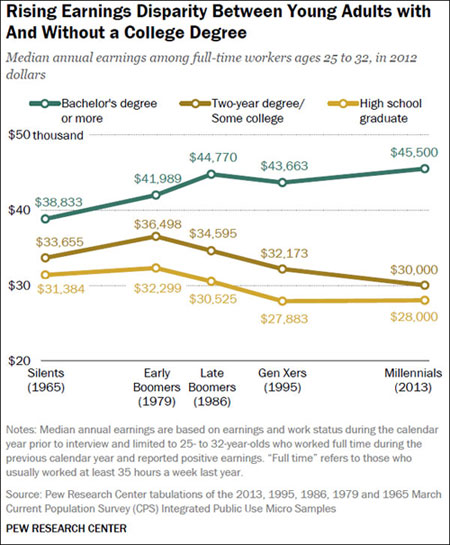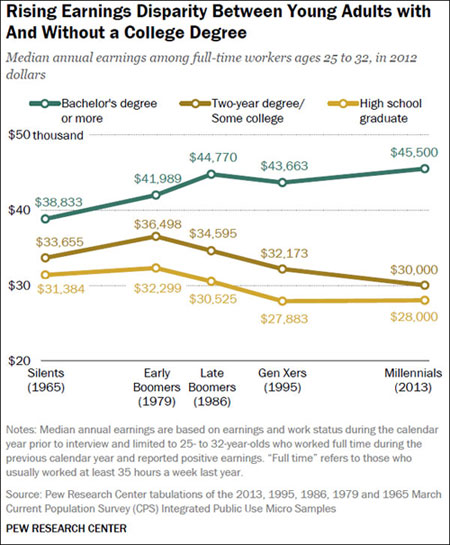
Today more Americans are completing college degrees than ever before. However, over the past few years, rising costs of higher education coupled with a competitive job market have resulted in some dampened expectations among recent college graduates. In 2011, as the deep recession was still reverberating, the Pew Research Center asked Americans if they believed college was still worth it. While college graduates overwhelmingly believed their education was ultimately a good investment, 75% of respondents stated that college has become too expensive for most Americans. Since that time, a great deal more pessimism about higher education has found its way into popular culture and the mass media. But the statistical data make a very strong case that the benefits of college — the “returns to education,” as scholars say — are increasing on average.
A 2014 Pew survey and report, “The Rising Cost of Not Going to College,” indicates that not only are college graduates more professionally successful than their peers with less education, but that the “disparity in economic outcomes between college graduates and those with a high school diploma or less formal schooling has never been greater in the modern era.” The report analyzes economic data from the Current Population Survey (CPS), as well as responses to a Pew Research Center survey conducted in October 2013. The survey targeted a nationally representative sample of 2,002 adults. The report’s authors are Paul Taylor, Kim Parker, Rich Morin, Rick Fry, Eileen Patten and Anna Brown.
Key findings include:
- Among respondents with a bachelor’s degree or more, 91% said their education has already paid off or they expect it to pay off in the future.
- This belief holds firm even when students had to go into debt to finance their education: “Even among the two-thirds of college-educated Millennials who borrowed money to pay for their schooling, about nine-in-ten (86%) say their degrees have been worth it or expect that they will be in the future.”
- College education has a strong effect on salary level. Full-time employed millennial college graduates (ages 25 to 32) earn about $17,500 more than employed young adults with only a high school diploma.
- Moreover, the disparity between incomes of those with a college degree and those with a high school diploma is growing wider: “For example, in 1979 when the first wave of Baby Boomers were the same age that Millennials are today, the typical high school graduate earned about three-quarters (77%) of what a college graduate made. Today, Millennials with only a high school diploma earn 62% of what the typical college graduate earns.”
- Young people without college degrees are more likely to live below the poverty line, not only compared to their peers who attended college, but also compared to those who did not attend college in previous eras: “Those ages 25 to 32, fully 22% with only a high school diploma are living in poverty, compared with 6% of today’s college-educated young adults. In contrast, only 7% of baby boomers who had only a high school diploma were in poverty in 1979 when they were in their late 20s and early 30s.”
- Consistent with earlier research, college major choices seem to matter with respect to job prospects. According to the survey, only 24% of science and engineering majors regretted their decision, compared with 33% of those whose degree is in social science, liberal arts or education.
- In terms of finding a fulfilling career path, there continues to be a stark divide along racial and economic lines: “Non-Hispanic whites (59%) are about twice as likely as blacks (29%) or Hispanics (22%) to say their current job is their career…. About half (49%) of those with family incomes below $50,000 say their work is just a job to get them by, a view held by only 10% of highest-earning adults.”
Related Research: A 2012 paper in the Annual Review of Sociology, “Social and Economic Returns to College Education in the United States,” provides comprehensive background on the state of the research field on these issues. The decision not to go to college, of course, may be influenced by more than just financial considerations. Many young people, particularly those from lower socioeconomic backgrounds, intend to go to college but either delay indefinitely or fail to complete a program. A 2013 study in The Journal of Higher Education examines these patterns and looks at the “penalty” for delaying entrance to college. Further, there are deep structural dynamics that prevent students from optimizing their success in higher education. A 2012 study for the National Bureau of Economic Research, “The Missing ‘One-Offs’: The Hidden Supply of High Achieving, Low Income Students,” looks at how top-tier higher education institutions still substantially fail to recruit talented young persons from disadvantaged backgrounds. Further, as new research from Stanford and Northwestern suggests, providing extra support for such students early on in college may be necessary to ensure better outcomes.
Keywords: higher education, youth

